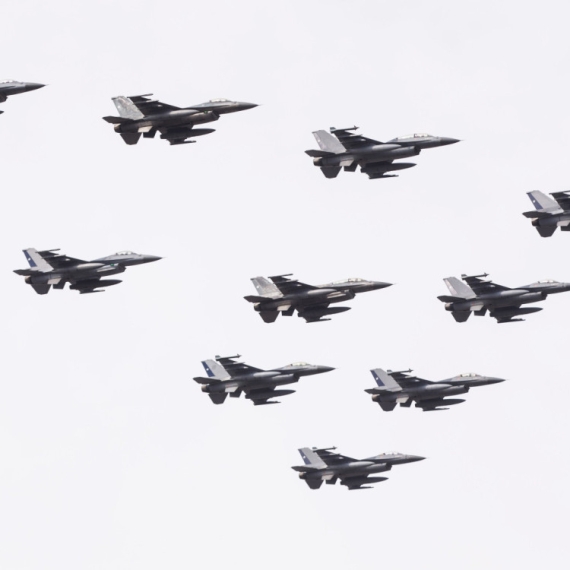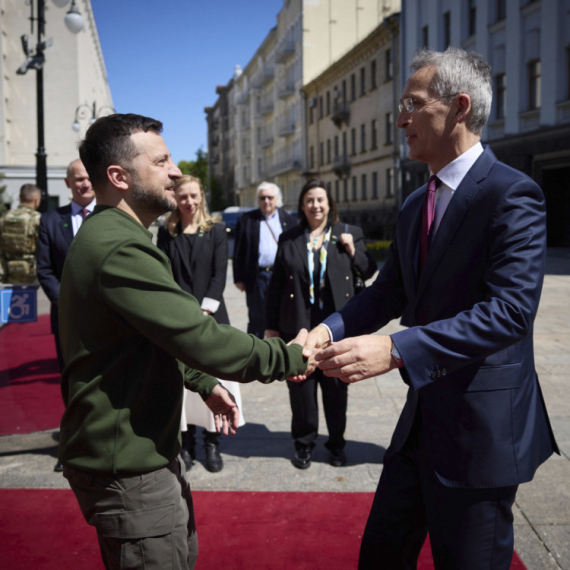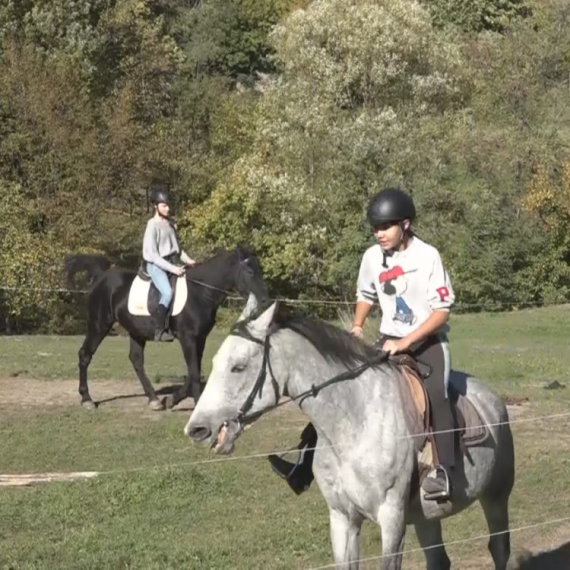Conservatives likely to win Iran vote
Conservatives were on course Saturday to win legislative elections in Iran, AFP reports.
Saturday, 15.03.2008.
13:11

Conservatives were on course Saturday to win legislative elections in Iran, AFP reports. But their reformist rivals are retaining a foothold in parliament despite the mass veto of candidates before the vote. Conservatives likely to win Iran vote The authorities hailed a "glorious" turnout of over 65 percent in Friday's poll, far higher than the lacklustre figure in the previous election in 2004 that saw reformists lose their majority in the chamber. "The nation's vote broke the enemy's back," the hardline Kayhan daily crowed on its front page. However, Iran's highly factional politics means it is unclear if the results will have any bearing on President Mahmoud Ahmadinejad's chance of winning the 2009 presidential poll. According to an AFP tally based on results announced so far by the interior ministry, reformists had won eight seats out of 40 and conservatives 16, with the rest going to independent candidates. Results from smaller towns and cities were to be announced Saturday but those from Tehran - which will deliver 30 MPs to the 290-seat parliament - would not be announced for several days, officials said. The main reformist coalition could only field 102 candidates for the 260 seats outside Tehran due to the pre-vote disqualifications but was still expecting to win 44 of these seats, its spokesman Abdollah Nasseri told AFP. If confirmed this would mean that reformists have managed to keep a respectable minority in parliament, where they currently have around 40 MPs, despite losing hundreds of their best candidates in the vetting. The semi-official Fars news agency projected that conservatives were set to reap 70 percent of the seats while English-language state television channel Press-TV said they had won 65 seats out of 89 decided so far. The authorities had called for a huge turnout to send a message of national unity to Iran's enemies amid continued tensions with the West over its nuclear drive. "Fortunately and contrary to our expectations, the participation has been overwhelming," Interior Minister Mostafa Pour Mohammadi said. But Iran's archfoe the United States condemned the elections as "cooked" after the disqualification by the hardline Guardians Council of hundreds of reformist candidates deemed insufficiently loyal to the Islamic revolution. The results are "cooked in the sense that the Iranian people were not able to vote for a full range of people," US State Department spokesman Sean McCormack said. Tehran results will be keenly awaited to see if reformists have recovered some of their former strength in the capital, where they fielded full lists of candidates and competed relatively evenly with conservatives. Reformists enjoyed their high point between 2000-2004 when they controlled parliament and their champion Mohammad Khatami was president. But they were left with only a few dozen seats in parliament after the 2004 election and the hardline Ahmadinejad took over the presidency a year later with the reformist government falling short of its lofty ambitions. Iran's former top nuclear negotiator Ali Larijani, standing for conservatives in the holy city of Qom, was elected to parliament in a landslide victory with 76 percent of the vote, Fars said. "Our list nationwide has been welcomed by the people and this is a sign of the trust people have in the service of the principalists," spokesman for the main conservative coalition, Shahabeddin Sadr, told AFP. Conservatives have split into "Broad" and "Unified" factions, with the former seen as less enthusiastic about the populist policies of Ahmadinejad although there is considerable overlap between the two. But the sidelining of reformists means it will be difficult to use the vote as a barometer of Ahmadinejad's popularity, despite discontent over inflation rates of almost 18 percent. The Iranian parliament wields a respectable amount of power but its capacities are limited by the unelected Guardians Council, which must approve all legislation. A woman votes in Iranian elections (FoNet)
Conservatives likely to win Iran vote
The authorities hailed a "glorious" turnout of over 65 percent in Friday's poll, far higher than the lacklustre figure in the previous election in 2004 that saw reformists lose their majority in the chamber."The nation's vote broke the enemy's back," the hardline Kayhan daily crowed on its front page.
However, Iran's highly factional politics means it is unclear if the results will have any bearing on President Mahmoud Ahmadinejad's chance of winning the 2009 presidential poll.
According to an AFP tally based on results announced so far by the interior ministry, reformists had won eight seats out of 40 and conservatives 16, with the rest going to independent candidates.
Results from smaller towns and cities were to be announced Saturday but those from Tehran - which will deliver 30 MPs to the 290-seat parliament - would not be announced for several days, officials said.
The main reformist coalition could only field 102 candidates for the 260 seats outside Tehran due to the pre-vote disqualifications but was still expecting to win 44 of these seats, its spokesman Abdollah Nasseri told AFP.
If confirmed this would mean that reformists have managed to keep a respectable minority in parliament, where they currently have around 40 MPs, despite losing hundreds of their best candidates in the vetting.
The semi-official Fars news agency projected that conservatives were set to reap 70 percent of the seats while English-language state television channel Press-TV said they had won 65 seats out of 89 decided so far.
The authorities had called for a huge turnout to send a message of national unity to Iran's enemies amid continued tensions with the West over its nuclear drive.
"Fortunately and contrary to our expectations, the participation has been overwhelming," Interior Minister Mostafa Pour Mohammadi said.
But Iran's archfoe the United States condemned the elections as "cooked" after the disqualification by the hardline Guardians Council of hundreds of reformist candidates deemed insufficiently loyal to the Islamic revolution.
The results are "cooked in the sense that the Iranian people were not able to vote for a full range of people," US State Department spokesman Sean McCormack said.
Tehran results will be keenly awaited to see if reformists have recovered some of their former strength in the capital, where they fielded full lists of candidates and competed relatively evenly with conservatives.
Reformists enjoyed their high point between 2000-2004 when they controlled parliament and their champion Mohammad Khatami was president.
But they were left with only a few dozen seats in parliament after the 2004 election and the hardline Ahmadinejad took over the presidency a year later with the reformist government falling short of its lofty ambitions.
Iran's former top nuclear negotiator Ali Larijani, standing for conservatives in the holy city of Qom, was elected to parliament in a landslide victory with 76 percent of the vote, Fars said.
"Our list nationwide has been welcomed by the people and this is a sign of the trust people have in the service of the principalists," spokesman for the main conservative coalition, Shahabeddin Sadr, told AFP.
Conservatives have split into "Broad" and "Unified" factions, with the former seen as less enthusiastic about the populist policies of Ahmadinejad although there is considerable overlap between the two.
But the sidelining of reformists means it will be difficult to use the vote as a barometer of Ahmadinejad's popularity, despite discontent over inflation rates of almost 18 percent.
The Iranian parliament wields a respectable amount of power but its capacities are limited by the unelected Guardians Council, which must approve all legislation.
















Komentari 0